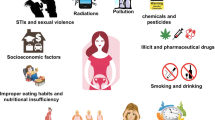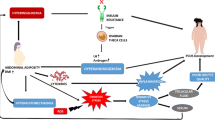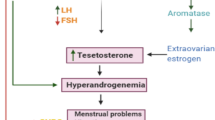Abstract
Obesity is increasing globally, and maternal obesity has adverse effects on pregnancy outcomes and the long-term health of offspring. Maternal obesity has been associated with pregnancy failure through impaired oogenesis and embryogenesis. However, whether maternal obesity causes chromosome abnormalities in oocytes has remained unclear. Here we show that chromosome abnormalities are increased in the oocytes of obese mice fed a high-fat diet and identify weakened sister-chromatid cohesion as the likely cause. Numbers of full-grown follicles retrieved from obese mice were the same as controls and the efficiency of in vitro oocyte maturation remained high. However, chromosome abnormalities presenting in both metaphase-I and metaphase-II were elevated, most prominently the premature separation of sister chromatids. Weakened sister-chromatid cohesion in oocytes from obese mice was manifested both as the terminalization of chiasmata in metaphase-I and as increased separation of sister centromeres in metaphase II. Obesity-associated abnormalities were elevated in older mice implying that maternal obesity exacerbates the deterioration of cohesion seen with advancing age.




Similar content being viewed by others
References
Angell RR (1991) Predivision in human oocytes at meiosis I: a mechanism for trisomy formation in man. Hum Genet 86:383–387
Angell RR, Xian J, Keith J, Ledger W, Baird DT (1994) First meiotic division abnormalities in human oocytes: mechanism of trisomy formation. Cytogenet Cell Genet 65:194–202
Ata B, Seyhan A, AI-Shalaty J, Escriva AM, Son WY, Tan SL (2013) Effect of body mass index on in vitro maturation treatment outcomes in women without polycystic ovarian syndrome. J IVF Reprod Med Genet 1:1
Bellver J, Ayllon Y, Ferrando M, Melo M, Goyri E, Pellicer A, Remohi J, Meseguer M (2010) Female obesity impairs in vitro fertilization outcome without affecting embryo quality. Fertil Steril 93:447–454
Bellver J, Pellicer A, Garcia-Velasco JA, Ballesteros A, Remohi J, Meseguer M (2013) Obesity reduces uterine receptivity: clinical experience from 9,587 first cycles of ovum donation with normal weight donors. Fertil Steril 100:1050–1058
Binder NK, Hannan NJ, Gardner DK (2012) Paternal diet-induced obesity retards early mouse embryo development, mitochondrial activity and pregnancy health. PLoS One 7:e52304
Boots CE, Boudoures A, Zhang W, Drury A, Moley KH (2016) Obesity-induced oocyte mitochondrial defects are partially prevented and rescued by supplementation with co-enzyme Q10 in a mouse model. Hum Reprod 31:2090–2097
Broughton DE, Moley KH (2017) Obesity and female infertility: potential mediators of obesity's impact. Fertil Steril 107:840–847
Burkhardt S, Borsos M, Szydlowska A, Godwin J, Williams SA, Cohen PE, Hirota T, Saitou M, Tachibana-Konwalski K (2016) Chromosome cohesion established by Rec8-cohesin in fetal oocytes is maintained without detectable turnover in oocytes arrested for months in mice. Curr Biol 26:678–685
Campbell JM, Lane M, Owens JA, Bakos HW (2015) Paternal obesity negatively affects male fertility and assisted reproduction outcomes: a systematic review and meta-analysis. Reprod BioMed Online 31:593–604
Cardozo E, Pavone ME, Hirshfeld-Cytron JE (2011) Metabolic syndrome and oocyte quality. Trends Endocrinol Metab 22:103–109
Cheng JM, Liu YX (2017) Age-related loss of cohesion: causes and effects. Int J Mol Sci 18
Cheng PP, Xia JJ, Wang HL, Chen JB, Wang FY, Zhang Y, Huang X, Zhang QJ, Qi ZQ (2011) Islet transplantation reverses the effects of maternal diabetes on mouse oocytes. Reproduction 141:417–424
Cheng JM, Li J, Tang JX, Hao XX, Wang ZP, Sun TC, Wang XX, Zhang Y, Chen SR, Liu YX (2017) Merotelic kinetochore attachment in oocyte meiosis II causes sister chromatids segregation errors in aged mice. Cell Cycle 16:1404–1413
Chiang T, Duncan FE, Schindler K, Schultz RM, Lampson MA (2010) Evidence that weakened centromere cohesion is a leading cause of age-related aneuploidy in oocytes. Curr Biol 20:1522–1528
Duncan FE, Hornick JE, Lampson MA, Schultz RM, Shea LD, Woodruff TK (2012) Chromosome cohesion decreases in human eggs with advanced maternal age. Aging Cell 11:1121–1124
Dunn GA, Bale TL (2009) Maternal high-fat diet promotes body length increases and insulin insensitivity in second-generation mice. Endocrinology 150:4999–5009
Eknoyan G (2008) Adolphe Quetelet (1796-1874)--the average man and indices of obesity. Nephrol Dial Transplant 23:47–51
Finger BJ, Harvey AJ, Green MP, Gardner DK (2015) Combined parental obesity negatively impacts preimplantation mouse embryo development, kinetics, morphology and metabolism. Hum Reprod 30:2084–2096
Fullston T, Shehadeh H, Sandeman LY, Kang WX, Wu LL, Robker RL, McPherson NO, Lane M (2015) Female offspring sired by diet induced obese male mice display impaired blastocyst development with molecular alterations to their ovaries, oocytes and cumulus cells. J Assist Reprod Genet 32:725–735
Ge (2014) DNA methylation in oocytes and liver of female mice and their offspring: effects of high-fat-diet induced obesity. Environ Health Perspect 122:159–164
Goncalves LF, Machado TQ, Castro-Pinheiro C, de Souza NG, Oliveira KJ, Fernandes-Santos C (2017) Ageing is associated with brown adipose tissue remodelling and loss of white fat browning in female C57BL/6 mice. Int J Exp Pathol 98:100–108
Han LS, Wang HC, Li L, Li XY, Ge J, Reiter RJ, Wang Q (2017) Melatonin protects against maternal obesity-associated oxidative stress and meiotic defects in oocytes via the SIRT3-SOD2-dependent pathway. J Pineal Res 63. doi: https://doi.org/10.1111/jpi.12431
Han LS, Ren C, Li L, Li XY, Ge J, Wang HC, Miao YL, Guo XJ, Moley KH, Shu WJ, Wang Q (2018) Embryonic defects induced by maternal obesity in mice derive from Stella insufficiency in oocytes (vol 50, pg 432, 2018). Nat Genet 50:768–768
Hauf S, Biswas A, Langegger M, Kawashima SA, Tsukahara T, Watanabe Y (2007) Aurora controls sister kinetochore mono-orientation and homolog bi-orientation in meiosis-I. EMBO J 26:4475–4486
Herbert M, Kalleas D, Cooney D, Lamb M, Lister L (2015) Meiosis and maternal aging: insights from aneuploid oocytes and trisomy births. Cold Spring Harb Perspect Biol 7:a017970
Heydemann A (2016) An overview of murine high fat diet as a model for type 2 diabetes mellitus. J Diabetes Res 2016:1–14
Hirose Y, Suzuki R, Ohba T, Hinohara Y, Matsuhara H, Yoshida M, Itabashi Y, Murakami H, Yamamoto A (2011) Chiasmata promote monopolar attachment of sister chromatids and their co-segregation toward the proper pole during meiosis I. PLoS Genet 7:e1001329
Hodges CA, Revenkova E, Jessberger R, Hassold TJ, Hunt PA (2005) SMC1beta-deficient female mice provide evidence that cohesins are a missing link in age-related nondisjunction. Nat Genet 37:1351–1355
Holt JE, Jones KT (2009) Control of homologous chromosome division in the mammalian oocyte. Mol Hum Reprod 15:139–147
Hou YJ, Zhu CC, Duan X, Liu HL, Wang Q, Sun SC (2016) Both diet and gene mutation induced obesity affect oocyte quality in mice. Sci Rep 6:18858
Hunt PA, Koehler KE, Susiarjo M, Hodges CA, Ilagan A, Voigt RC, Thomas S, Thomas BF, Hassold TJ (2003) Bisphenol a exposure causes meiotic aneuploidy in the female mouse. Curr Biol 13:546–553
Hunter N (2017) Oocyte quality control: causes, mechanisms, and consequences. Cold Spring Harb Symp Quant Biol 82:235–247
Igosheva N, Abramov AY, Poston L, Eckert JJ, Fleming TP, Duchen MR, McConnell J (2010) Maternal diet-induced obesity alters mitochondrial activity and redox status in mouse oocytes and zygotes. PLoS One 5:e10074
Jagiello G, Fang JS (1979) Analyses of diplotene chiasma frequencies in mouse oocytes and spermatocytes in relation to ageing and sexual dimorphism. Cytogenet Cell Genet 23:53–60
Jessberger R (2012) Age-related aneuploidy through cohesion exhaustion. EMBO Rep 13:539–546
Jia Z, Feng Z, Wang L, Li H, Wang H, Xu D, Zhao X, Feng D, Feng X (2018) Resveratrol reverses the adverse effects of a diet-induced obese murine model on oocyte quality and zona pellucida softening. Food Funct 9:2623–2633
Jones KT, Lane SI (2013) Molecular causes of aneuploidy in mammalian eggs. Development 140:3719–3730
Jungheim ES, Schoeller EL, Marquard KL, Louden ED, Schaffer JE, Moley KH (2010) Diet-induced obesity model: abnormal oocytes and persistent growth abnormalities in the offspring. Endocrinology 151:4039–4046
Jungheim ES, Schon SB, Schulte MB, DeUgarte DA, Fowler SA, Tuuli MG (2013) IVF outcomes in obese donor oocyte recipients: a systematic review and meta-analysis. Hum Reprod 28:2720–2727
Kitajima TS, Sakuno T, Ishiguro K, Iemura S, Natsume T, Kawashima SA, Watanabe Y (2006) Shugoshin collaborates with protein phosphatase 2A to protect cohesin. Nature 441:46–52
Kudo NR, Wassmann K, Anger M, Schuh M, Wirth KG, Xu H, Helmhart W, Kudo H, McKay M, Maro B, Ellenberg J, de Boer P, Nasmyth K (2006) Resolution of chiasmata in oocytes requires separase-mediated proteolysis. Cell 126:135–146
Kouznetsova A, Lister L, Nordenskjold M, Herbert M, Hoog C (2007) Bi-orientation of achiasmatic chromosomes in meiosis I oocytes contributes to aneuploidy in mice. Nature Genetics 39: 966-968
Lacefield S, Murray AW (2007) The spindle checkpoint rescues the meiotic segregation of chromosomes whose crossovers are far from the centromere. Nature Genetics 39: 1273-1277
Lashen H, Fear K, Sturdee DW (2004) Obesity is associated with increased risk of first trimester and recurrent miscarriage: matched case-control study. Hum Reprod 19:1644–1646
Lister LM, Kouznetsova A, Hyslop LA, Kalleas D, Pace SL, Barel JC, Nathan A, Floros V, Adelfalk C, Watanabe Y, Jessberger R, Kirkwood TB, Hoog C, Herbert M (2010) Age-related meiotic segregation errors in mammalian oocytes are preceded by depletion of cohesin and Sgo2. Curr Biol 20:1511–1521
Luke B, Brown MB, Stern JE, Missmer SA, Fujimoto VY, Leach R, Grp ASW (2011) Female obesity adversely affects assisted reproductive technology (ART) pregnancy and live birth rates. Hum Reprod 26:245–252
Luzzo KM, Wang Q, Purcell SH, Chi M, Jimenez PT, Grindler N, Schedl T, Moley KH (2012) High fat diet induced developmental defects in the mouse: oocyte meiotic aneuploidy and fetal growth retardation/brain defects. PLoS One 7:e49217
MacLennan M, Crichton JH, Playfoot CJ, Adams IR (2015) Oocyte development, meiosis and aneuploidy. Semin Cell Dev Biol 45:68–76
McPherson NO, Bell VG, Zander-Fox DL, Fullston T, Wu LL, Robker RL, Lane M (2015) When two obese parents are worse than one! Impacts on embryo and fetal development. Am J Physiol Endocrinol Metab 309:E568–E581
Mihalas BP, Bromfield EG, Sutherland JM, De Iuliis GN, McLaughlin EA, Aitken RJ, Nixon B (2018) Oxidative damage in naturally aged mouse oocytes is exacerbated by dysregulation of proteasomal activity. J Biol Chem 293:18944–18964
Minge CE, Bennett BD, Norman RJ, Robker RL (2008) Peroxisome proliferator-activated receptor-gamma agonist rosiglitazone reverses the adverse effects of diet-induced obesity on oocyte quality. Endocrinology 149:2646–2656
Nagaoka SI, Hassold TJ, Hunt PA (2012) Human aneuploidy: mechanisms and new insights into an age-old problem. Nat Rev Genet 13:493–504
Nagaoka SI, Hodges CA, Albertini DF, Hunt PA (2011) Oocyte-specific differences in cell-cycle control create an innate susceptibility to meiotic errors. Current Biology 21: 651-657.
Ottolini CS, Newnham LJ, Capalbo A, Natesan SA, Joshi HA, Cimadomo D, Griffin DK, Sage K, Summers MC, Thornhill AR, Housworth E, Herbert AD, Rienzi L, Ubaldi FM, Handyside AH, Hoffmann ER (2015) Genome-wide maps of recombination and chromosome segregation in human oocytes and embryos show selection for maternal recombination rates. Nat Genet 47:727–735
Ozekinci M, Seven A, Olgan S, Sakinci M, Keskin U, Akar ME, Ceyhan ST, Ergun A (2015) Does obesity have detrimental effects on IVF treatment outcomes? BMC Womens Health 15:61
Patel J, Tan SL, Hartshorne GM, McAinsh AD (2015) Unique geometry of sister kinetochores in human oocytes during meiosis I may explain maternal age-associated increases in chromosomal abnormalities. Biol Open 5:178–184
Perkins AT, Das TM, Panzera LC, Bickel SE (2016) Oxidative stress in oocytes during midprophase induces premature loss of cohesion and chromosome segregation errors. Proc Natl Acad Sci U S A 113:E6823–E6830
Pfannenberg C, Werner MK, Ripkens S, Stef I, Deckert A, Schmadl M, Reimold M, Haring HU, Claussen CD, Stefan N (2010) Impact of age on the relationships of brown adipose tissue with sex and adiposity in humans. Diabetes 59:1789–1793
Qiao H, Rao H, Yun Y, Sandhu S, Fong JH, Sapre M, Nguyen M, Tham A, Van BW, Chng TYH, Lee A, Hunter N (2018) Impeding DNA break repair enables oocyte quality control. Mol Cell 72:211–221 e213
Reichman R, Alleva B, Smolikove S (2017) Prophase I: preparing chromosomes for segregation in the developing oocyte. Results Probl Cell Differ 59:125–173
Revenkova E, Herrmann K, Adelfalk C, Jessberger R (2010) Oocyte cohesin expression restricted to predictyate stages provides full fertility and prevents aneuploidy. Curr Biol 20:1529–1533
Saben JL, Boudoures AL, Asghar Z, Thompson A, Drury A, Zhang W, Chi M, Cusumano A, Scheaffer S, Moley KH (2016) Maternal metabolic syndrome programs mitochondrial dysfunction via germline changes across three generations. Cell Rep 16:1–8
Sakakibara Y, Hashimoto S, Nakaoka Y, Kouznetsova A, Hoog C, Kitajima TS (2015) Bivalent separation into univalents precedes age-related meiosis I errors in oocytes. Nature Communications 6:7550.
Sakuno T, Tanaka K, Hauf S, Watanabe Y (2011) Repositioning of aurora B promoted by chiasmata ensures sister chromatid mono-orientation in meiosis I. Developmental Cell 21:534-545.
Selesniemi K, Lee HJ, Muhlhauser A, Tilly JL (2011) Prevention of maternal aging-associated oocyte aneuploidy and meiotic spindle defects in mice by dietary and genetic strategies. Proc Natl Acad Sci U S A 108:12319–12324
Severson AF, Meyer BJ (2014) Divergent kleisin subunits of cohesin specify mechanisms to tether and release meiotic chromosomes. eLife 3:e03467
Shomper M, Lappa C, FitzHarris G (2014) Kinetochore microtubule establishment is defective in oocytes from aged mice. Cell Cycle 13:1171–1179
Snider AP, Wood JR (2019) Obesity induces ovarian inflammation and reduces oocyte quality. Reproduction. https://doi.org/10.1530/REP-18-0583
Speed RM (1977) The effects of ageing on the meiotic chromosomes of male and female mice. Chromosoma 64:241–254
Tachibana-Konwalski K, Godwin J, van der Weyden L, Champion L, Kudo NR, Adams DJ, Nasmyth K (2010) Rec8-containing cohesin maintains bivalents without turnover during the growing phase of mouse oocytes. Genes Dev 24:2505–2516
Tachibana-Konwalski K, Godwin J, Borsos M, Rattani A, Adams DJ, Nasmyth K (2013) Spindle assembly checkpoint of oocytes depends on a kinetochore structure determined by cohesin in meiosis I. Curr Biol 23:2534–2539
Tsutsumi M, Fujiwara R, Nishizawa H, Ito M, Kogo H, Inagaki H, Ohye T, Kato T, Fujii T, Kurahashi H (2014) Age-related decrease of meiotic cohesins in human oocytes. PLoS One 9:e96710
Wang Q, Ratchford AM, Chi MMY, Schoeller E, Frolova A, Schedl T, Moley KH (2009) Maternal diabetes causes mitochondrial dysfunction and meiotic defects in murine oocytes. Mol Endocrinol 23:1603–1612
Watanabe Y (2012) Geometry and force behind kinetochore orientation: lessons from meiosis. Nat Rev Mol Cell Biol 13:370–382
Watkins AJ, Dias I, Tsuro H, Allen D, Emes RD, Moreton J, Wilson R, Ingram RJM, Sinclair KD (2018) Paternal diet programs offspring health through sperm- and seminal plasma-specific pathways in mice. Proc Natl Acad Sci U S A 115:10064–10069
Wu LLY, Dunning KR, Yang X, Russell DL, Lane M, Norman RJ, Robker RL (2010) High-fat diet causes lipotoxicity responses in cumulus-oocyte complexes and decreased fertilization rates. Endocrinology 151:5438–5445
Wu LL, Russell DL, Wong SL, Chen M, Tsai TS, St John JC, Norman RJ, Febbraio MA, Carroll J, Robker RL (2015) Mitochondrial dysfunction in oocytes of obese mothers: transmission to offspring and reversal by pharmacological endoplasmic reticulum stress inhibitors. Development 142:681–691
Yun Y, Lane SI, Jones KT (2014) Premature dyad separation in meiosis II is the major segregation error with maternal age in mouse oocytes. Development 141:199–208
Zhang D, Zhu Y, Gao H, Zhou B, Zhang R, Wang T, Ding G, Qu F, Huang H, Lu X (2010) Overweight and obesity negatively affect the outcomes of ovarian stimulation and in vitro fertilisation: a cohort study of 2628 Chinese women. Gynecol Endocrinol 26:325–332
Zhang JJ, Feret M, Chang L, Yang M, Merhi Z (2015a) Obesity adversely impacts the number and maturity of oocytes in conventional IVF not in minimal stimulation IVF. Gynecol Endocrinol 31:409–413
Zhang L, Han L, Ma R, Hou X, Yu Y, Sun S, Xu Y, Schedl T, Moley KH, Wang Q (2015b) Sirt3 prevents maternal obesity-associated oxidative stress and meiotic defects in mouse oocytes. Cell Cycle 14:2959–2968
Zhao LH, Lu TF, Gao L, Fu XW, Zhu SE, Hou YP (2017) Enriched endoplasmic reticulum-mitochondria interactions result in mitochondrial dysfunction and apoptosis in oocytes from obese mice. J Anim Sci Biotechnol 8:62. https://doi.org/10.1186/s40104-017-0195-z
Zielinska AP, Holubcova Z, Blayney M, Elder K, Schuh M (2015) Sister kinetochore splitting and precocious disintegration of bivalents could explain the maternal age effect. eLife 4:e11389
Acknowledgments
We thank Richard Shultz and members of the Hunter Lab for support and discussions. N.H. is an Investigator of the Howard Hughes Medical Institute, which also supported this study.
Author information
Authors and Affiliations
Corresponding author
Additional information
Publisher’s note
Springer Nature remains neutral with regard to jurisdictional claims in published maps and institutional affiliations.
This article is part of a Special Issue on “Recent advances in meiosis from DNA replication to chromosome segregation” edited by Valérie Borde and Francesca Cole, co-edited by Paula Cohen and Scott Keeney.
Rights and permissions
About this article
Cite this article
Yun, Y., Wei, Z. & Hunter, N. Maternal obesity enhances oocyte chromosome abnormalities associated with aging. Chromosoma 128, 413–421 (2019). https://doi.org/10.1007/s00412-019-00716-6
Received:
Revised:
Accepted:
Published:
Issue Date:
DOI: https://doi.org/10.1007/s00412-019-00716-6




